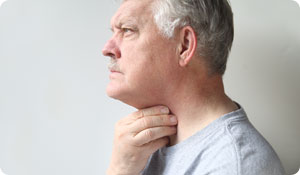
When you think about gastroesophageal reflux disease (GERD), you think heartburn. And yes, that's a classic symptom of reflux, but you can have reflux disease without having heartburn symptoms.
Reflux can affect the larynx and throat, too, not just the esophagus. When that happens, it's called laryngopharyngeal reflux (LPRD), and may not cause heartburn. Instead, you may experience symptoms such as hoarseness, post-nasal drip, and sore throat.
"Reflux takes different forms, and when you have the condition without heartburn, it's called 'silent reflux,'" says Jamie Koufman, MD, director of The Voice Institute of New York and co-author of Dropping Acid: The Reflux Diet Cookbook and Cure.
While GERD is sometimes the result of a weak or faulty lower esophageal sphincter (LES), LPRD can be the result of a weak or faulty upper esophageal sphincter (UES). That's the valve at the junction of the throat and esophagus. "If the upper valve fails, it can be pretty serious," says Kaufman.
That's because we don't just reflux stomach acid. We also reflux an enzyme called pepsin. "Imagine pepsin as little lobsters that, once refluxed, can attach themselves to the lining of the throat," explains Koufman. "Once they've taken up residence, acid from ingested food—not just from the stomach—can activate the enzyme and cause damage to the throat."
When this happens, you most likely won't experience heartburn, as if you had acid refluxed into the esophagus (though some people with LPRD do). What's more, you can suffer from both GERD and LPRD.
Beyond heartburn, GERD sufferers usually complain of regurgitation and nausea. LPRD can cause disease symptoms that mimic asthma and can cause sinusitis, chronic cough, and dental erosions. Since LPRD doesn't always cause heartburn it can be difficult to diagnose.
So, how do you know if you have silent reflux? Take Dr. Koufman's quiz below.
Koufman Reflux Symptom Index Quiz
In the last month, how did the following problems affect you? Answer each question on a scale of zero to five: 0=no problem; 5=severe problem.
- Hoarseness or a problem with your voice
- Clearing your throat
- Excess throat mucous or postnasal drip
- Difficulty swallowing food, liquids, or pills
- Coughing after you ate or after lying down
- Breathing difficulties or choking episodes
- Troublesome or annoying cough
- Sensations of something sticking in your throat or a lump in your throat
- Heartburn, chest pain, indigestion, or stomach acid coming up
A score of 15 or more means that you have a 90 percent chance of having esophageal or airway reflux.
Make an appointment with your doctor today to discuss your symptoms. You may be referred to a gastroenterologist, an Ear, Nose, and Throat specialist, or a laryngologist.
The good news: Treatment for GERD and LPRD usually consists of medicines that reduce the acid. However, Koufman maintains that what you eat and when you eat (i.e., curbing large nighttime meals) will go a long way in helping you manage the condition.
Koufman, MD, reviewed this article.
Source:
Jamie Koufman M.D., director of The Voice Institute of New York and co-author of Dropping Acid: The Reflux Diet Cookbook and Cure (www.refluxcookbook.com).
http://www.voiceinstituteofnewyork.com/the-larynx-whisperer/





